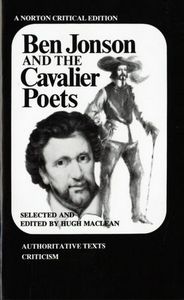Fifth in the series of Sheldonian Reprints and renderings of masterpieces in all languages edited by Reginal Hewitt
(1440?-1478), Spanish poet and soldier, was born probably at Paredes de Nava. The fourth son of Rodrigo Manrique, count de Paredes, he became like the rest of his family a fervent partisan of Queen Isabel, served with great distinction in many engagements, and was made comendador of Montizon in the order of Santiago. He was killed in a skirmish near the fortress of Garci-Munoz in 1478, and was buried in the church attached to the convent of Ucles. His love-songs, satires, and acrostic verses are merely ingenious compositions in the taste of his age; he owes his imperishable renown to a single poem, the Coplas por la muerte de su padre, an elegy of forty stanzas on the death of his father, which was apparently first printed in the Cancionero llamado de Fray Inigo de Mendoza about the year 1482. There is no foundation for the theory that Manrique drew his inspiration from an Arabic poem by Abu `l-Baka Salih ar-Rundi; the form of the Coplas- is influenced by the Consejos of his uncle, Gomez Manrique, and the matter derives from the Bible, from Boethius and from other sources readily accessible. The great sonorous commonplaces on death are vitalized by the intensely personal grief of the poet, who lent a new solemnity and significance to thoughts which had been for centuries the common property of mankind. It was given to Jorge Manrique to have one single moment of sublime expression, and this isolated achievement has won him a fame undimmed by any change of taste during four centuries_ The best edition of the Coplas is that issued by R. Foulche-Delbosc in the Bibliotheca hispanica; the poem has been admirably translated by Longfellow. Manrique's other verses were mostly printed in Hernando del Castillo's Cancionero general (1511).
Jorge Manrique (c. 1440 – 1479) was a major Spanish poet, whose main work, the Coplas a la muerte de su padre (Stanzas about the Death of his Father), is still read today. He was a supporter of the great Spanish queen, Isabel I of Castile, and actively participated on her side in the civil war that broke out against her half-brother, Enrique IV, when the latter attempted to make his daughter, Juana, crown princess. Jorge died in 1479 during an attempt to take the castle of Garcimuñoz after Isabel gained the crown.Manrique were one of major Spanish aristocratic families of the Jewish converso descent.
Coplas a la muerte de su padre is Jorge Manrique's best composition. It is a funeral elegy dedicated to the memory of Rodrigo Manrique, who died on 11 November 1476 in Ocaña. Jorge thought that his father led a life worth living, and his poem contrasts types of life (or death):
* the terrestrial life that ends in death
* the eternal life after death
* the life of the fame
